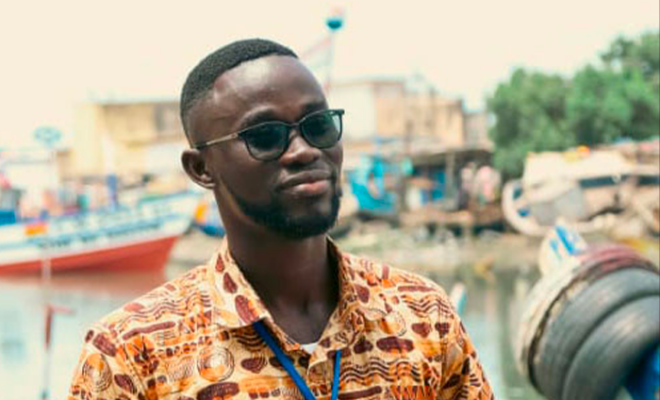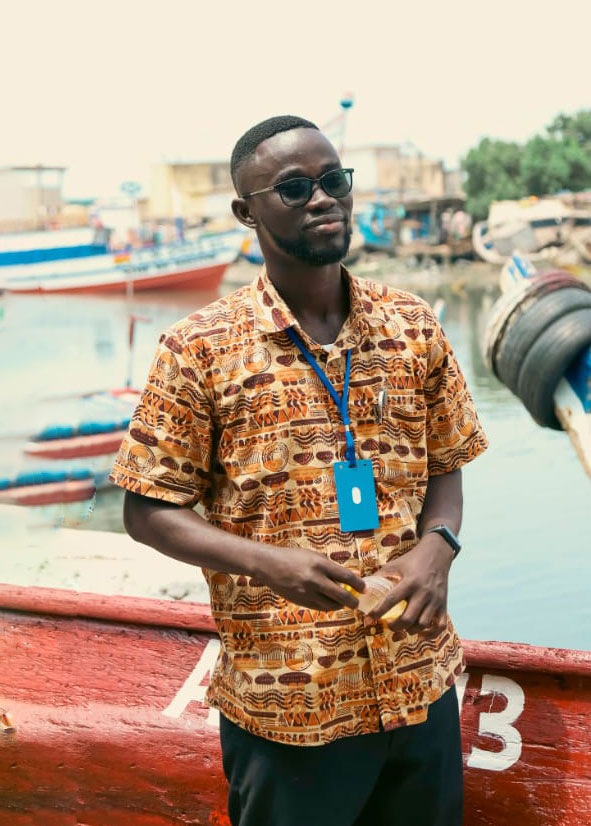Spotlight on early-career researchers: Kenneth Amankwaah Boateng

I am a Master of Philosophy Sociology student and an early-career researcher at the University of Cape Coast, Ghana. I have been part of the One Ocean Hub since 2021 and my research has focused on women, children, and coastal communities in the context of the blue economy, under the supervision of Dr. Georgina Y. Oduro. I recently submitted my MPhil thesis in Sociology, which aimed at exploring the experiences and challenges of fish mammies in coastal Ghana. Fish mammies have been one of the most invisible and marginalised women occupational groups in artisanal fisheries, but they play a significant role in ocean governance.

1. What’s your greatest achievement since you started working for the One Ocean Hub?
The greatest achievement I have been proud of since I started working for the One Ocean Hub is the successful completion of my thesis which explored the sociocultural basis of canoe ownership amongst women in matrilineal and patrilineal kinship contexts in coastal Ghana. It also explored the significant differences in the appropriate social practices and the gender roles of fish mammies in artisanal fisheries.
Linked to this achievement is my co-authorship of a policy brief which informed One Ocean Hub’s Written Evidence to the United Nations High Commissioner for Human Rights report on the adverse impact of climate change on the right to food. (see here); and another feature on Women, Girls, and the rights to a Healthy Environment by the UN Special Rapporteur on Human Rights and the Environment.
I have also engaged as a field assistant to One Ocean Hub’s documentaries for the International Year of Artisanal Fisheries and Aquaculture-2022 on Improving the Protection of Women’s Human Rights in Small-scale Fisheries in Ghana in 2022 as well as Menace of Ocean Plastics, which was led by Dr. Georgina Yaa Oduro and Dr. Bolanle Erinosho and showcased at an international meeting organised by UNEP.
2. How has the Hub enhanced your leadership skills?
Before enrolling in graduate school I was not clear that I wanted an academic career but through the Hub and working with Dr. Georgina Yaa Oduro, I have been guided, equipped, and galvanised to have enough authority on a subject that I have truly come to love. I have been fortunate to be offered the frame to deliver presentations during the Hub’s recent workshop in Ghana to determine sustainable fishery management scenario and their social implications and Ghana Sociological and Anthropological Association. Indeed, this has been fundamental to shaping my scholarly interests such that I am now able to take initiative regarding conducting reviews, fieldwork, writing research papers, and presentation skills. More so the Hub’s partnerships with FAO and and other UN bodies have created a wide international audience for my work. This was in the case of my contribution as a co-author in a written submission on gender and the human right to a healthy environment for the UN Special Rapporteur on Human Rights and the Environment (see here).
More so since I was employed by the Hub as a student research assistant, I have had the greatest fortune of interacting and connecting with other Co-researchers on various disciplines. These have enabled me to cultivate perspectives on how fish mammies from respective kinship contexts in coastal Ghana have produced performances to shape the masculine discourses inherent in respective artisanal fisheries, and how their favourable hierarchical position in the fisheries have propelled their effort to partake in ocean governance through the enforcement of customary laws, and combating Illegal, Unreported and Unregulated fishing.
3. What, in your view, have been the Hub’s most impactful activities?
The Hub’s ongoing research on human rights, climate change, and the ocean has been tremendously impactful in giving voices to invisible and marginalised stakeholders (especially women) in coastal communities. The most remarkable impact lies in the Hub’s bid to integrate stakeholders’ knowledge into climate change mitigation policies and safeguard their human rights to achieving the Sustainable Development Goals.
The Hub’s recent participation in UN Climate COP27 provided an incredible opportunity to listen and learn from these marginalised voices on how their activities have been instrumental to shaping ocean governance in their respective coastal communities.
4. How does your work contribute to shaping the One Ocean Hub’s interdisciplinary
endeavours?
My work centres on fish mammies or women canoe owners who are likened to the female equivalent of male canoe owners or capitalists in Ghana’s artisanal fishery. To understand the nature of their work, I aimed at exploring their experiences, challenges, and prospects for ocean governance. Interestingly, I happen to find that fish mammies’ gender roles, social practices that reinforce gender roles, and identities and performance within the artisanal fishery are underpinned by matrilineal and patrilineal kinship norms, and their gendered socialisation before becoming canoe owners in their respective fishing communities in coastal Ghana. It also found that fish mammies due to their favourable hierarchical position in the fisheries can champion the regulation of Illegal, Unreported, and Unregulated fishing, as well as enact customary laws to control fishing expeditions in an attempt to safeguard the health of the ocean, even though they are not represented in local fishing governing structures.
Ultimately, my research contributes to conversations on human rights and the Hub’s interdisciplinary endeavours to ensure sustained attention on gender issues in the blue economy, ocean governance, and support for intangible cultural heritage in coastal communities.
5. What are the aspects of working in a collaborative environment such as the One Ocean Hub that you value the most?
I am deeply inspired by the opportunity as a early-career researcher to learn from scholars from various disciplines and countries. I constantly exchange and engage with other ECR fellows working across diverse disciplines and from all walks of life. This is where I saw intellectual friendships!
6. What are the challenges and new demands that early-career researchers face today?
Undoubtedly the conundrum where ECRs want to get published in top-tier journals and at the same to not want to be marginalised or left out since research and publication is important for our career progression. This gets more complicated in Africa as there continues to be little investment in research, making it difficult for young scientists like myself to obtain funding to sustain research ambitions and pursuits. For example, I am currently exploring an opportunity for both funding and admission to pursue a PhD programme.
7. What is your advice to fellow early-career researchers working on a global development project?
Certainly, it is an incredible honour to be an early-career researchers in one way specifically: simply the promise that we will do something great, whereas working on global development projects is the evidence that we are making good strides. Understanding what this means, I think this should be the realisation for many of us who are novice ECRs to inculcate to propel us to be open to mentorship from well-established scholars from within and outside the Hub.
I think that there is no substitute for diversity and so we should be prepared for the fact that as ECRs the path is not straight, and what I did which worked well for me when writing my MPhil thesis was acknowledging authors for their contributions through emails. Surprisingly the few that responded to my mail were in awe of my work and gave me props. To this end, we shouldn’t assume that only fellow ECRs in the Hub are only our allies. There are allies everywhere. Let us find them for mentorship and other opportunities.